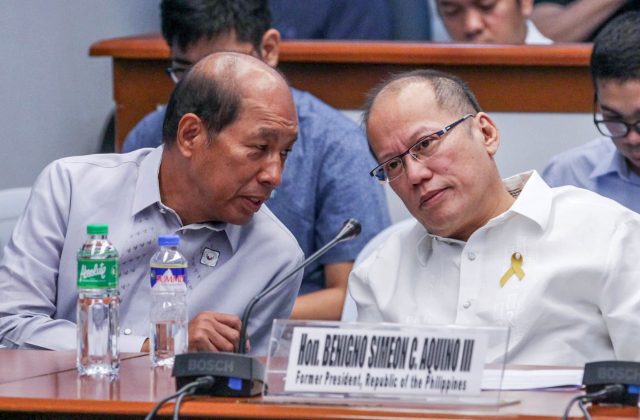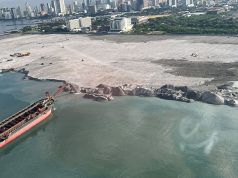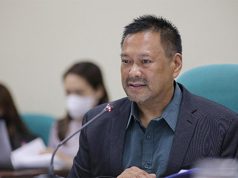
MANILA – It was vital that a budget for Dengvaxia be secured before the end of 2015, despite then President Benigno Aquino III meeting with Sanofi Pasteur executives just a few weeks before that on December 1, 2015, because it would be “very, very difficult” to find a source for the budget and to get Congress to approve it by the first quarter of 2016 – an election year. Not getting a budget in 2015 would mean pushing the dengue school-based immunization program to 2017 at the earliest, because the budget would be approved in 2016 for 2017.
This was Aquino’s explanation for what seemed to be a shortcut that the Department of Budget and Management took and which had been questioned by the Senate Blue Ribbon Committee and the Senate Committee on Health, which conducted a joint hearing on the vaccine on Thursday.
Blue Ribbon Committee chairperson Senator Richard Gordon noted, and former Budget Secretary Florencio Abad confirmed, that on December 23, 2015, the latter issued a memorandum for Aquino recommending the funding of projects for 2015 from the savings from the Miscellaneous Personnel Benefits Fund (MPBF).
Abad confirmed that he suggested that the MPBF be used for Dengvaxia, given that the savings would no longer be usable after December 31 when it reverted back to the treasury.
JV CALLS OUT ABAD ON USE OF MPBF
Health Committee chairperson JV Ejercito then asked Abad if it was usual during the latter’s time as secretary to utilize the MPBF for items that were not in the General Appropriations Act, such as Dengvaxia, given that the latter’s worth was P3.5 billion – a huge sum.
Abad said it was usual if the MPBF was to fund an item that existed in the GAA, but was deficient.
Ejercito then pointed out that the dengue vaccine was not in the GAA.
Abad replied that the “appropriation item” was the Expanded Program for Immunization (EPI), which should suffice as the item that was deficient, but was existing and could be augmented.
Earlier, Gordon mentioned that the budged for EPI in 2015 was P3.36 billion for nine vaccines (excluding Dengvaxia) for the entire country.
Ejercito also asked if Aquino was aware that Dengvaxia was not in the GAA, and that the MPBF would be used for it.
Aquino replied that they had been looking for a solution to the dengue problem, and the vaccine would have been included in the GAA, but at the time, the drug had not yet gone through the Food and Drug Administration and the Formulary Executive Council.
“Legally, it doesn’t exist. You cannot fund something that doesn’t exist,” Aquino said. They had to wait until the process was completed, with the expectation that they would get to the point where it would have to be funded. The reverse was that if the processes were not completed, the budget would not be spent, Aquino explained.
Gordon noted that Abad had requested Aquino to declare as savings the P14.5 billion worth of MPBF from the fiscal year of 2015 GAA so that the amount could be used for projects of various agencies, including the dengue vaccine, under the EPI for three regions: the National Capital Region, Region 3 and Region 4-A.
Aquino said earlier these three regions were chosen because Department of Health data showed these were among those with the highest incidence of dengue.
Abad confirmed this.
Gordon said that afterwards, on December 28, 2015, the DBM asked the EPI to prepare the procurement documents for the dengue vaccine. The Department of Health Family Health Office submitted a request to then Health Secretary Janette Garin for the exemption of Dengvaxia from the Philippine National Drug Formulary. And by December 29, 2015, a Special Allotment Release Order (SARO) was released for the P3.5 billion for Dengvaxia.
Gordon marveled at how important Dengvaxia must be to the administration at the time that it was approved so quickly by the FDA and the SARO was immediately released.
Aquino then explained that if the savings weren’t utilized by December 31, 2015, it would revert to the Treasury. How would Dengvaxia then be funded? They could ask for a supplemental budget, which would require new sources of revenue. Would Congress be able to approve the request by the first quarter of 2016? This would be “very, very difficult,” Aquino said, answering his own question. If the budget was not immediately arrived at, the first implementation of the vaccine would be in 2017, at the earliest.
The choice was simple, he said. Implement the program now, or wait for at least a year and expose the public to the risk of contracting dengue – which could be prevented by the vaccine.
“For the record, what we had then was none of this warning that happened in November 2017,” Aquino said, referring to the Sanofi Pasteur’s November 29 advisory that stirred a tempest, sparking fear among thousands of parents who vaccinated children, and leading to the congressional investigation.
On November 29, Sanofi issued an advisory saying that after six years of studies, they found that while it could prevent subsequent infections among those previously infected, Dengvaxia could lead to severe dengue for zero-negative vaccinees or those who had not been infected with dengue prior to immunization, should they come down with dengue later.









